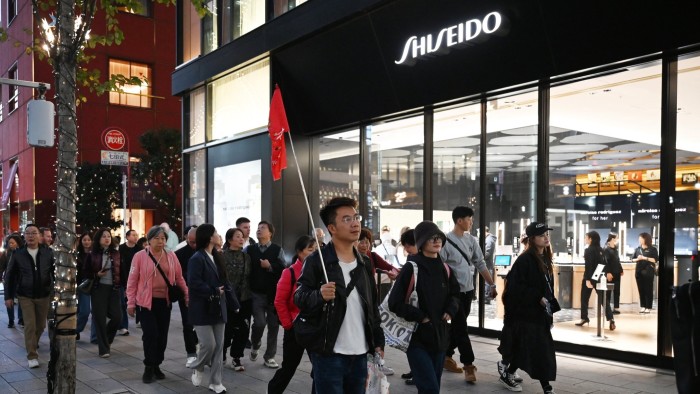Unlock the Editor’s Digest for free
Roula Khalaf, Editor of the FT, selects her favourite stories in this weekly newsletter.
The once familiar sight of Chinese tour groups in Tokyo’s shopping districts risks becoming a thing of the past. That shift — the result of renewed geopolitical tensions — will send ripples through Japan’s economy, with consequences for industries dependent on their degree of exposure to Chinese consumers. Few sectors are more exposed than beauty.
The sell-off in Japanese consumer stocks began last week after Beijing issued a travel advisory against visiting Japan, warning Chinese nationals of heightened risks. This guidance followed Prime Minister Sanae Takaichi’s suggestion that Japan could regard any military action around Taiwan as a “survival-threatening situation”.
Among the hardest hit is Shiseido, a Japanese beauty group with a market capitalisation equivalent to $5.6bn. Its shares have fallen by almost a fifth, significantly underperforming the broader market. China and travel retail account for more than a third of the company’s global sales, and revenue from that segment was already shrinking this year.

The stakes are high. Chinese visitors are the highest spenders among all foreign tourists to Japan, accounting for over a quarter of all inbound consumption at the latest count. China also accounts for around one in every four visitors to Japan this year — a ratio that has surged in recent months, according to data from the Japan National Tourism Organization. In response, Tokyo has dispatched a senior diplomat to Beijing in an effort to steady relations before the fallout worsens.
History suggests such caution is warranted. In 2017, when South Korea agreed to deploy the US Thaad missile system as part of a joint security initiative, China responded with sweeping restrictions and a ban on group tours. Chinese arrivals collapsed and both sales and share prices of Korean beauty groups Amorepacific and LG Household & Health Care slumped. Amorepacific’s stock fell nearly 70 per cent from peak to trough.
A similar pattern played out in 2012 during a dispute over the islands known as Diaoyu in China and Senkaku in Japan, when Chinese visitor numbers to Japan more than halved within four months.
The fallout is only beginning to unfold. As Beijing’s travel advisory against Japan starts to take effect, at least two major state-owned Chinese travel agencies have reportedly scrapped group itineraries for December, cancelling pre-booked flights and hotel stays.
What began as a diplomatic exchange of words is now turning into a serious threat to Japan’s economic recovery. The country’s reliance on Chinese demand was once seen as one of its biggest growth engines. The market is justly worried those hopes may now take flight — or in this case, take a flight to somewhere else.
